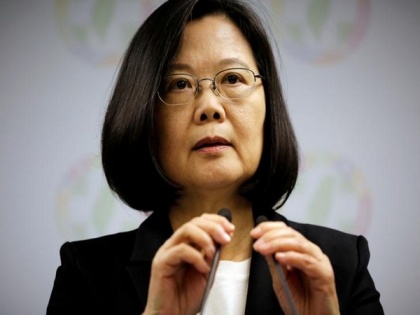Democracy, peace and prosperity in Indo-Pacific are currently facing serious challenges: Taiwan President on National Day
By ANI | Published: October 10, 2020 05:26 PM2020-10-10T17:26:09+5:302020-10-10T17:40:08+5:30
Taiwan will "continue to show resilience" against the "growing internal and external changes seen in the past decades", President Tsai Ing-wen said on the occasion of the country's 109th Double Tenth National Day Celebration on Saturday.

Democracy, peace and prosperity in Indo-Pacific are currently facing serious challenges: Taiwan President on National Day
Asserting that democracy and peace in Indo-Pacific are currently facing serious challenges, Taiwan President Tsai Ing-wen on Saturday said they will "continue to show resilience" against the "growing internal and external changes seen in decades".
She was speaking on the occasion of the country's 109th Double Tenth National Day Celebration on Saturday.
"To address the greatest internal and external changes we have seen in decades... the government will take the helm and lead the way forward with three major strategies to create the new Taiwan economy we all aspire to," she said in her National Day address titled "2020 Proud of Taiwan".
"As commander-in-chief, I always have the future of our military and our military of the future in my heart. We will continue to modernise defensive combat capabilities and accelerate the upgrading of our asymmetrical capabilities to deal with military expansion and provocation from the other side of the Taiwan Strait," she added, referring to China.
On the recent developments in the Indo-Pacific region, the President said, "For some time we have all been paying close attention to changes in regional security. From sovereignty disputes in the South and East China Seas and the China-India border conflict to developments in the Taiwan Strait and the "Hong Kong version of the National Security Law" that has garnered international concern, it is clear that democracy, peace and prosperity in the Indo-Pacific are currently facing serious challenges."
She urged the "leader across the Strait" (Chinese President Xi Jinping) to stick to the video message that he delivered at the United Nations General Assembly.
"...the leader across the Strait has publicly stated in a video message to the United Nations General Assembly that China will never seek hegemony, expansion, or a sphere of influence. As countries in the region and around the world are now concerned about China's expanding hegemony, we hope this is the beginning of genuine change," she said.
She added if Beijing can heed Taiwan's voice, change the way it handles cross-strait relations, and jointly facilitate cross-strait reconciliation and peaceful dialogue, regional tension can surely be resolved.
"As long as the Beijing authorities are willing to resolve antagonisms and improve cross-strait relations, while parity and dignity are maintained, we are willing to work together to facilitate mengful dialogue. This is what the people of Taiwan advocate, and it is a cross-party consensus," the President said.
The strong usage of words against China comes weeks after it flew 37 aircraft, including bomber and fighter jets, over the Taiwan Strait following the visit of a US State Department official, which apparently angered Beijing.
According to the South China Morning Post, China regards Taipei as a "breakaway province" and has said that it wouldn't mind using force to claim it. At the same time, Beijing has also accused Washington and Taipei of promoting independence.
Taiwan had responded to China's threat in a cheeky manner.
"How do you deal with a neighbour sending you death threats just for having dinner with friends visiting from afar? Asking for a friend," Taiwan presidential office spokesperson tweeted.
This statement followed a threat published in Chinese newspaper Global Times after the US Undersecretary for Economic Affairs Keith Krach visited Taipei.
"Taiwan leader Tsai Ing-wen, who pledged deeper ties with the US at a dinner for a visiting senior State Department official, is clearly playing with fire. If any act of her provocation violates the Anti-secession Law of China, a war will be set off and Tsai will be wiped out," wrote Global Times.
( With inputs from ANI )
Disclaimer: This post has been auto-published from an agency feed without any modifications to the text and has not been reviewed by an editor
Open in app